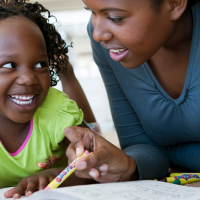Proper Learning and Development is the responsibility of everyone involved in the life of the child. The home and the school have to work hand in hand to ensure the child gets the best education he can. Demands need to be made by parents from the schools and all personnel involved in the child’s learning process. Education should influence the intellectual and character realms of the child, thereby preparing the child to meet the workplace demands of this century and become the best human being he can possibly be.
Today’s world is characterised by compressed space, compressed time, innovative thinking and effectiveness. The human capital is no longer defined by the standards of a secluded geographical zone, but by the global standards of particular industries i.e by their best practices. These are the realities that should be incorporated into our curriculum. These are the demands parents should be making- Are the children being taught soft skills? Are their emotional and social intelligence being honed? Is homework impacting on the overall development of the child?
As the demands of the day have changed, so should the demands of education. Parents now need to be aware and conscious enough to demand meaningful and impactful extracurricular activities from schools, as it is no time to engage children in frivolous activities that have no impact on who and what they hope to become. Furthermore, education is not about the physical structure of the school. Therefore be deliberate about the caliber of people whose mindset, conduct and nuances influence your child.
Schools should be involved in observing and understanding the child’s character development, behaviour and intelligence, with the aim of using this knowledge as a tool in shaping the child into a whole and well-rounded being. Children’s development should be monitored and the feedback be discussed so a work plan between the home and school can be agreed upon.
How do parents ensure that their wards are getting the right education due them at their age? What influence are parents supposed to wield on the schools their children attend, other than informing them of a new activity introduced by a rival school? What exactly do parents pay for when they pay school fees? These are some of the important questions that will help parents and guardians figure out and demand the best educational strategies for their children and wards from the schools they attend. The proliferation of schools is not just to create competition, but to bring out the best and create the outstanding instead of an elaborate array of bland options. Consequently, like other industries, schools should be held to the service promises they make.
While grades are the most evident result of going through a school, society’s interest and emphasis on grades should not blur parents’ focus on proper education when scouting for schools. What can the school offer beyond the display of excellent results on the walls of school receptions? Grades are important but not at the expense of gaining actual knowledge.
Education in the 21st century should mirror the evolution of marketplace requirements and technology. Hence, parents as part of this evolution should demand that their children be prepared and fit for the future.












Comments